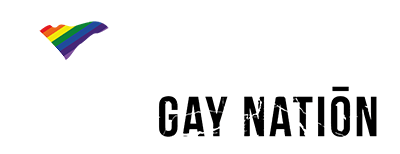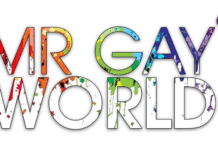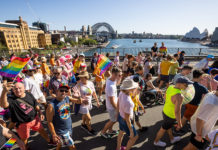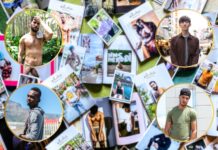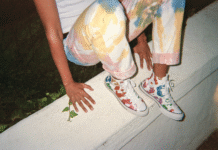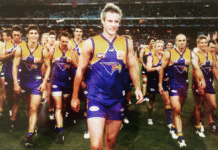
My Introduction to HIV and AIDS began as a very young child living in America during the late 80s and early 1990s, in what was a drastically different time from where we find ourselves today.
My mum was volunteering with the Austin Texas AIDS Foundation working as a buddy for people who were living and dying from late-stage HIV infection.
She was a friend, a massage therapist and a carer for people who were scared and alone in a time when even the fear of touch and the sense of the unknown seemed to permeate through every aspect of the AIDS crisis.
As a child, I didn’t grasp the enormity of the situation as we protested George Bush and the inadequacy of the government’s response with her friends.
Even the title AIDS Walk for life lacked context in my 6-year-old brain.
Though I remember my perspective widening considerably as I sat in the car one day after school while my mum made her routine checks and seeing her distraught and trying to hold herself together because one of her buddies had taken his life from the struggle of his health complications compounded with stigma and public perceptions and misconceptions of the virus.
Even now I find it hard to comprehend the toll of people falling through the cracks in the system and the gaps in human kindness and yet even though we are steadily evolving and we are laden with new tools and strategies for the HIV response people still are doing exactly that.
I was one of them.
I was diagnosed in a busy sexual health clinic in inner-city Sydney in 2005 and I remember the experience being the equivalent of a revolving door.
There was no linkage into care or support and the cursory information I was given about my new life as an HIV positive person completely washed over me.
All I took from the discussion was that this wasn’t the HIV from the experiences of my childhood and that I could have a normal long fulfilling life.
Even with my upbringing I was woefully unprepared and misinformed about the realities of what it means to live with HIV, how to manage my health, and what I would face when I first told people.
Stigma is without a doubt the bitterest pill to swallow as a person living with HIV.

I still remember in my search for support disclosing to one of my oldest friends who turned to me and had the audacity and cruelty to say “We always knew you were going to get it.”
What makes HIV so different from any other medical condition are that these sorts of responses are still so prevalent? Is it the moralistic point of view that because I enjoy sex I am a lesser person who had it coming? Because I’m gay it’s just par for the course? Because I was young I was stupid?
And the reality is that no, in fact, I didn’t deserve to contract HIV, no one does.
But stigma is far more insidious than that, it is prohibitive to every single step of the HIV response.
It makes getting tested terrifying, because what happens if the people at the clinic judge me and worse, what happens if I get a positive result.
It makes disclosure of your status gut wrenching, because who could possibly still want me or be attracted to me if I have HIV.
And for me it, combined with the lack of support systems made taking ownership of my health and looking after myself really daunting because I felt like I brought this on myself, I felt disgusting and at the very core of it like a total failure.
So instead I turned to avoidance and drugs and anything else that could take my mind off the realities of my status.
And I had so easily convinced myself that this was 2005, I had nothing to worry about, and that this wasn’t the AIDS crisis of my upbringing.
It took seven years for that precarious denial to crash down around me.
By the time I finally saw a specialist and started treatment the damage of my evasion was both inescapable and outwardly evident.
I was skeletal, 44 kgs to be exact, my viral load was obscene and my immune system was non-existent with a CD4 count in the single digits and all that entails.
I was admitted into the hospital with just about every single opportunistic infection you could possibly have without any of the AIDS defining illnesses.
I was told in no uncertain terms that if I had of carried on with my denial and my bullshit that he doubted I would have been alive come 2013.
Even though it didn’t feel like it with the parade of hospital stays, I was and am incredibly lucky.
This was the life changing wake up call I needed to finally seek out my HIV positive community and get the support I should have had when I was first diagnosed but more importantly solely focus my energy on getting well and reversing the damage I had done, moving back to New Zealand and taking ownership of my HIV status has been the best decision of my life.

I made the decision to go public about my status and devote my life to HIV advocacy and education 2 years ago on World AIDS Day.
On the surface it was a flippant decision, I didn’t spend days weighing up the pro’s and cons and possible ramifications my extremely public disclosure could have or ultimately how it would change me as a person.
I just remember being tired of the occasional offensive HIV or AIDS comment or joke popping up in my facebook feed.
Tired of seeing the media make faux-pas in their language choices and sensationalist headlines used in telling our stories and speaking about the virus.
Tired of seeing innocuous yet stigmatising messages like Clean, you be too in dating profiles.
Above all else, I was tired of feeling like because of my status I wasn’t able to live my life with transparency and dignity.
If you had of told me that I would be devoting my life to HIV awareness and advocacy all those years ago I would have laughed in your face but it has turned out that HIV does, in fact, define me, for the better.
I knew that the only way we will work through the issues that people living with HIV face is through putting a face to it, making it personal, and having frank discussions. And for all the scientific advances and progress I’d be lying if I said there isn’t so much work still to be done.

HIV doesn’t seem to be a priority for the government, even though we finally have the tools needed to end the epidemic. And without political will and funding, the cold hard truth is that we will never get there.
In New Zealand last year we had the highest number of new diagnosis of HIV and yet I am still seeing people say that HIV is an issue of the past which is as frightening as it is untrue.
And attitudes have definitely changed since the 80’s and 90’s but yet ignorance and stigma are very much still inescapable parts of living with HIV.
Stigma insidiously silences the voices of PLHIV and our right to live openly with dignity.
But more than that, in my view it is the single most prohibitive thing to the HIV response.
It makes the prospect of testing and taking ownership of your health really daunting for a good number of people, it makes disclosure really challenging and at the crux of it, it all stems from outdated misinformation, ignorance, and fear which often go hand in hand with new transmissions of HIV.
It’s 2016 and now more than ever we have everything we need to make a real change but we can’t do it with apathy, ignorance or complacency.
For more on Charlie and the other finalists of Mr. Gay New Zealand visit the website www.mrgaynewzealand.com
Last Updated on Jan 30, 2017
The news team for Gay Nation love tips from our readers. Got tips or a news story that you would like published? Go here to tell us something.
Visit the Gay Nation store Now

